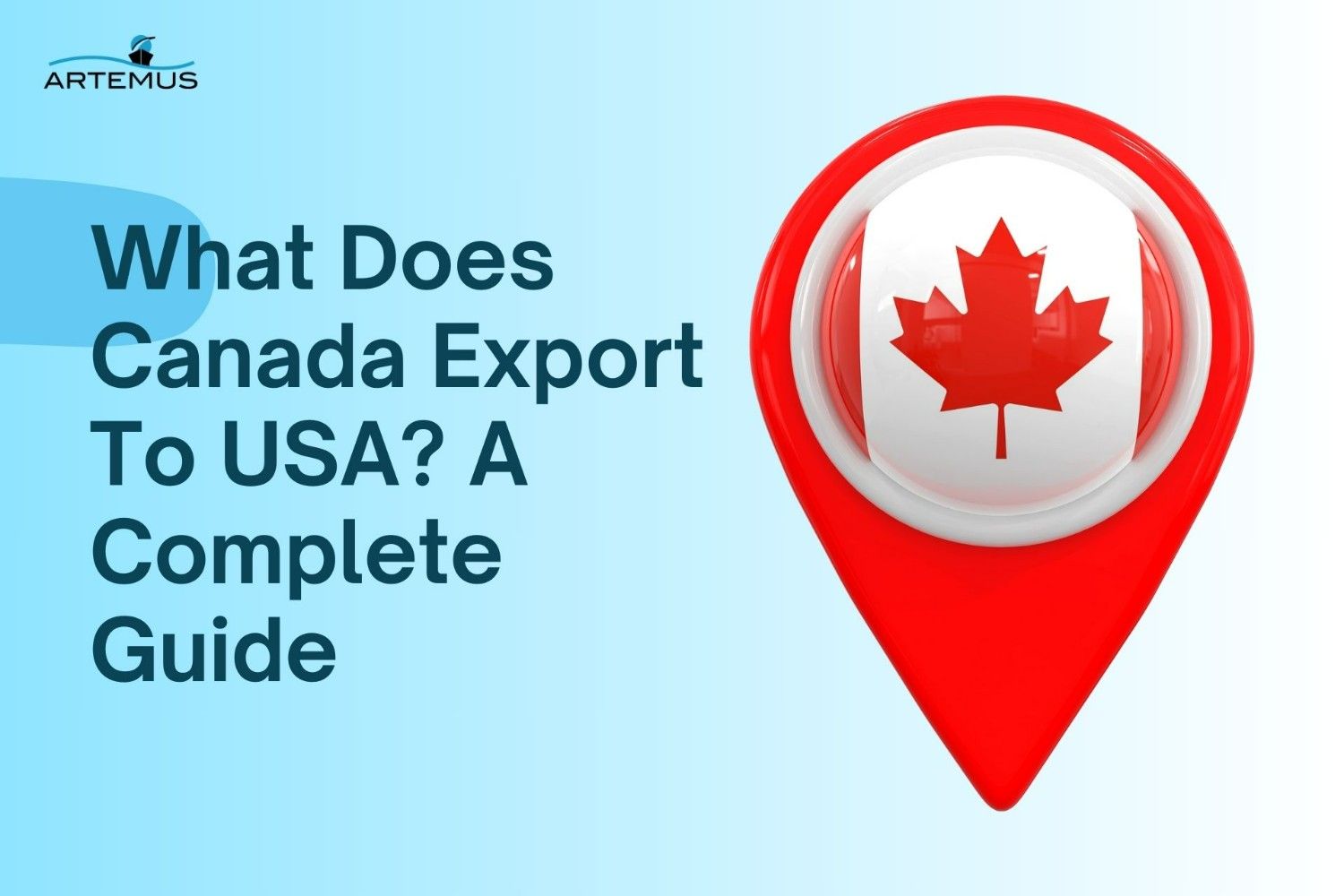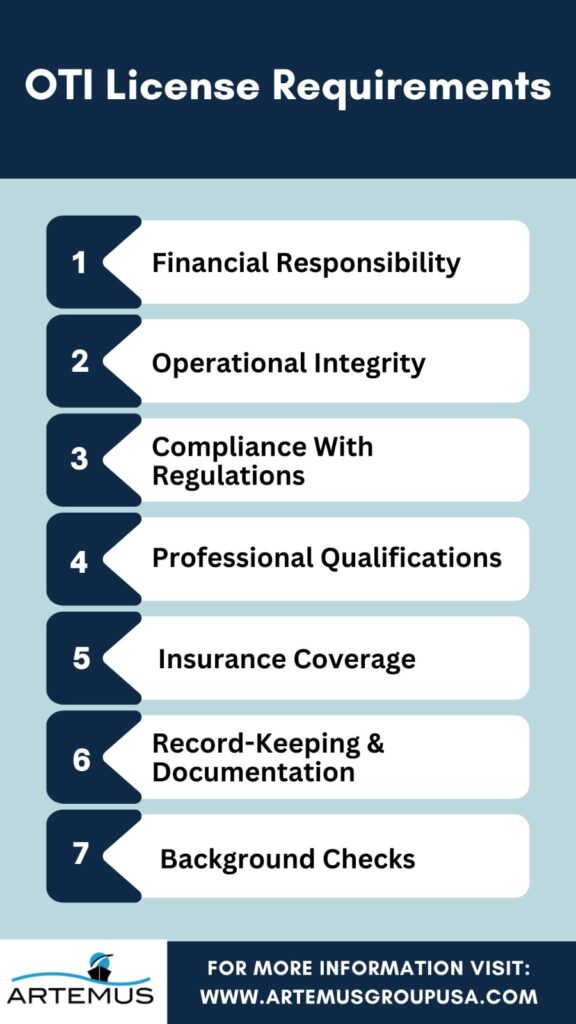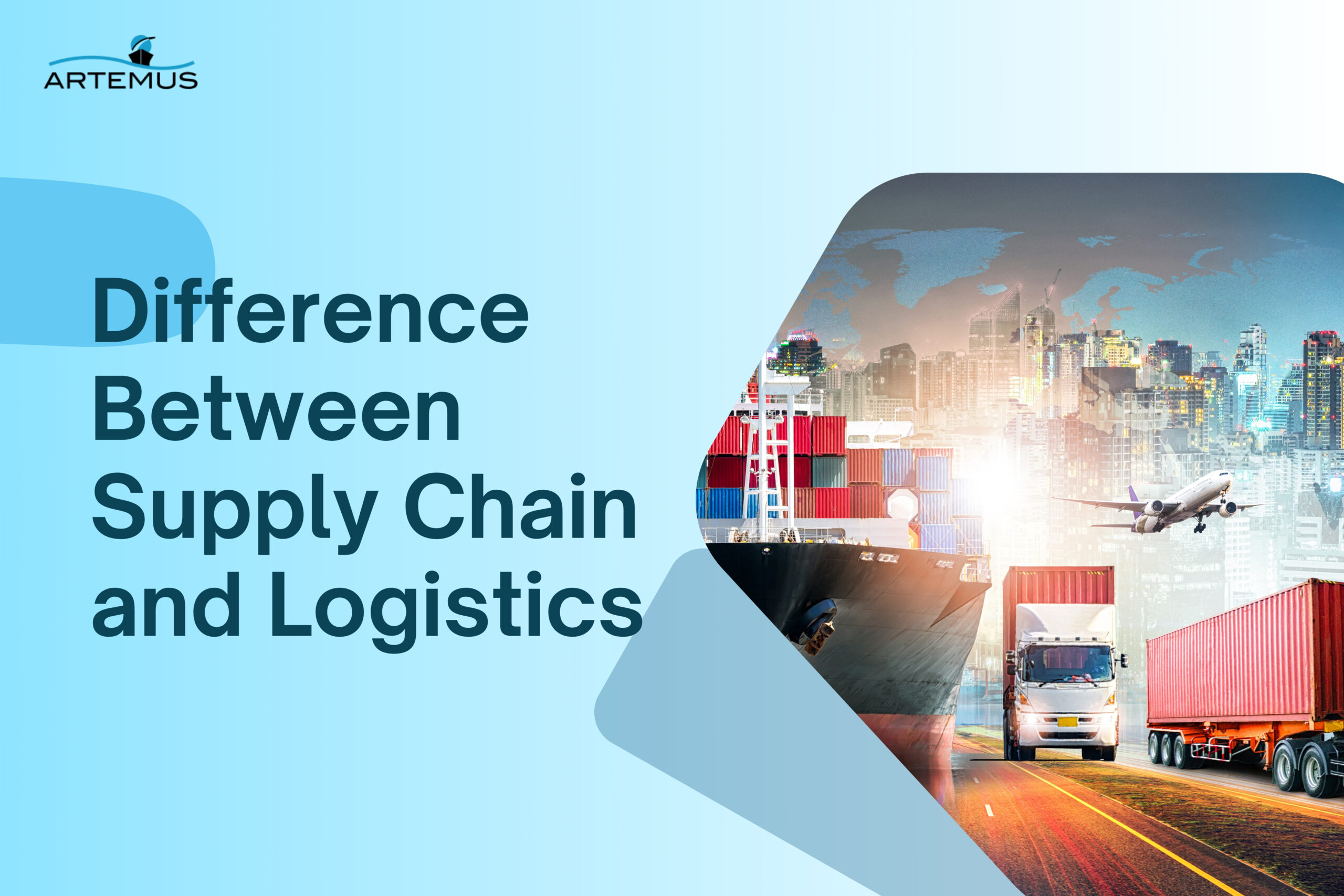
What Does Canada Export To USA? A Complete Guide
What Does Canada Export To USA? This question is key to understanding one of the most important trade relationships in

Navigating the seas of international trade requires more than just ships and cargo. It requires expertise in the complex regulatory environment that governs ocean transportation. One crucial aspect of this regulatory landscape is the Ocean Transportation Intermediary (OTI) license. In this blog, we’ll explore everything you need to know about obtaining and maintaining an OTI license, from understanding the regulatory requirements to navigating the licensing process effectively.
Whether you’re a seasoned player in the shipping industry or a newcomer looking to establish your presence, understanding the ins and outs of OTI licensing is essential for success. Moreover, Artemus Transportation Solutions offers expert guidance and support for businesses seeking to obtain their Ocean Transportation Intermediary (OTI) license
Table Of Contents
An Ocean Transportation Intermediary (OTI) license is a regulatory authorization required for companies arranging or facilitating goods transportation by ocean freight. Regulatory entities like the Federal Maritime Commission (FMC) in the United States issue an OTI license, indicating adherence to industry standards and regulations. OTIs play a crucial role in the global supply chain, acting as intermediaries between shippers and carriers, arranging cargo shipments, negotiating rates, and handling documentation.
Obtaining an OTI license involves meeting specific criteria set forth by regulatory authorities, including financial responsibility, operational integrity, and compliance with applicable laws and regulations. This licensure ensures that OTIs adhere to professional standards, maintain proper documentation, and provide a level of assurance to both shippers and carriers in their transactions.
Additionally, an OTI license grants access to exclusive contracts and carrier rates, facilitating efficient and cost-effective transportation solutions for businesses involved in international trade.
Related: What Is Global Trade Compliance & Its Key Components
The regulatory body overseeing the issuance and regulation of Ocean Transportation Intermediary (OTI) licenses varies by country. In the United States, the primary regulatory authority responsible for OTI licensing is the Federal Maritime Commission (FMC). Established in 1961, the FMC is an independent federal agency tasked with regulating the nation’s international ocean transportation for the benefit of exporters, importers, and the American consumer.
The FMC’s mandate includes overseeing OTIs to ensure fair competition, protect consumers, and promote a vibrant and efficient ocean transportation system. As part of its regulatory role, the FMC administers the licensing process for OTIs, including Ocean Freight Forwarders (OFFs) and Non-Vessel Operating Common Carriers (NVOCCs). OTIs seeking to operate in the United States must apply for and obtain a license from the FMC, demonstrating compliance with the agency’s requirements.
The FMC evaluates applicants based on various criteria, including financial responsibility, operational integrity, and compliance with applicable laws and regulations. Once licensed, OTIs are subject to ongoing oversight by the FMC to ensure continued adherence to regulatory standards. The commission also investigates complaints, enforces regulations, and imposes penalties for non-compliance, safeguarding the interests of shippers, carriers, and the public.
Related: Custom Clearance Documents Required In USA, India, & Japan

Obtaining an Ocean Transportation Intermediary (OTI) license involves navigating a structured process overseen by regulatory authorities such as the Federal Maritime Commission (FMC) in the United States. While specific requirements may vary by jurisdiction, the following steps generally outline the process of obtaining an OTI license:
Begin by thoroughly researching the licensing requirements set forth by the relevant regulatory authority, such as the FMC. Review the applicable laws, regulations, and guidelines governing OTIs to ensure a clear understanding of the obligations and expectations.
Gather the necessary documentation and information required for the license application. This typically includes financial statements, proof of financial responsibility (such as a surety bond or insurance), business incorporation documents, organizational structure details, and background information on key personnel.
Complete the official application form provided by the regulatory authority. Ensure that all required fields are accurately filled out and that all supporting documentation is included with the application. Submit the application along with any applicable fees as specified by the regulatory body.
As part of the licensing process, key personnel associated with the OTI may be subject to background checks. This could involve verifying criminal history, financial standing, and any relevant professional qualifications.
Depending on the jurisdiction and type of OTI license sought, applicants may need to pass an examination demonstrating their knowledge of relevant laws, regulations, and industry practices. Prepare adequately for any required examinations to increase the likelihood of success.
Once the application is submitted, it undergoes review by the regulatory authority. This process may take several weeks or months, during which the authority may request additional information or clarification. Be prepared to respond promptly to any inquiries.
Upon completing the application review process, the regulatory authority will issue the OTI license. Review the terms and conditions of the license carefully to ensure compliance with all requirements and obligations imposed by the regulatory authority.
After obtaining the OTI license, ensure ongoing compliance with all regulatory requirements, including record-keeping, financial reporting, and adherence to industry standards. Renew the license as required and promptly address any changes in business operations that may affect compliance status.
Related: How Long Does Customs Clearance Take? Key Takeaways

Ocean Transportation Intermediaries (OTIs) play a pivotal role in facilitating international trade by arranging the transportation of goods via ocean freight. To ensure professionalism, accountability, and adherence to industry standards, OTIs must meet specific requirements to obtain and maintain their licenses. Here’s an overview of the key OTI license requirements:
OTIs must demonstrate financial stability and solvency to obtain a license. This typically involves providing financial statements, bank references, or surety bonds to prove the ability to fulfill contractual obligations and cover potential liabilities.
OTIs must operate with integrity, honesty, and transparency in their business practices. Regulatory authorities assess the OTI’s reputation, track record, and compliance history to ensure ethical conduct and reliability in service provision.
OTIs must comply with all applicable laws, regulations, and licensing requirements set forth by regulatory bodies such as the Federal Maritime Commission (FMC) in the United States. This includes filing tariffs, service contracts, and other required documentation, as well as adhering to anti-corruption laws and environmental regulations.
Key personnel associated with the OTI, such as officers, directors, and qualifying individuals, must meet specific professional qualifications. This may include passing examinations, obtaining relevant certifications, or demonstrating industry experience and expertise.
OTIs are typically required to maintain insurance coverage to protect against potential risks and liabilities associated with their operations. This may include liability insurance, cargo insurance, or errors and omissions insurance, depending on the nature of the services provided.
OTIs must maintain accurate records and documentation of their transactions, contracts, and communications with customers and carriers. This ensures transparency, accountability, and compliance with regulatory reporting requirements.
Regulatory authorities may conduct background checks on key personnel associated with the OTI to verify their suitability for licensure. This may include reviewing criminal history, financial standing, and any disciplinary actions or sanctions.
Related: Shipment Has Been Given A Release Status By Customs

Ocean Transportation Intermediaries (OTIs) operate within a highly regulated environment governed by a plethora of shipping laws and regulations. Compliance with these laws is paramount for OTIs to ensure the smooth and lawful facilitation of cargo transportation. Here’s an overview of some key compliance areas and regulations that OTIs must adhere to:
The FMC regulates OTIs operating in the United States. OTIs are required to comply with various FMC regulations, including licensing requirements, tariff publication, and the filing of service contracts. Compliance with FMC regulations ensures fair competition, consumer protection, and industry transparency.
Enacted to promote a competitive and efficient ocean transportation system, the Shipping Act of 1984 governs various aspects of the maritime industry, including carrier agreements, rates, and practices. OTIs must adhere to the provisions of the Shipping Act, which prohibits unfair or deceptive practices and ensures fair treatment of shippers and carriers.
OTIs are required to publish tariffs detailing their rates, charges, terms, and conditions for ocean transportation services. These tariffs must be filed with the appropriate regulatory authority, such as the FMC, and made available to the public. Compliance with tariff publication requirements ensures transparency and consistency in pricing and service offerings.
OTIs entering into service contracts with ocean carriers must file these contracts with the FMC. Service contracts outline the terms and conditions of carriage, including rates, cargo volumes, and service commitments. Compliance with service contract filing requirements promotes fairness, transparency, and regulatory oversight in contractual relationships between OTIs and carriers.
OTIs must comply with anti-corruption laws, such as the U.S. Foreign Corrupt Practices Act (FCPA), which prohibits bribery and corruption in international business transactions. OTIs conducting business globally must ensure compliance with anti-corruption laws to avoid legal liabilities and reputational damage.
OTIs must also navigate customs regulations governing the import and export of goods. Compliance with customs regulations involves accurate documentation, tariff classification, valuation, and adherence to import/export controls and procedures. Non-compliance with customs regulations may lead to delays, fines, and additional penalties.
OTIs may be subject to environmental regulations aimed at minimizing the environmental impact of maritime operations. Compliance with environmental regulations involves adhering to pollution prevention measures, waste management practices, and emissions standards to mitigate environmental risks and protect marine ecosystems.
Related: Customs Compliance Software: Key Benefits & Top Suggestions
Obtaining an Ocean Transportation Intermediary (OTI) license involves various fees and costs, which can vary depending on the jurisdiction and type of license sought. Understanding these expenses is crucial for businesses considering entry into the ocean transportation industry.
Initially, applicants must cover a non-refundable application fee, which encompasses administrative costs associated with processing and initial reviews. Upon approval, OTIs are then required to pay a license fee, the amount of which varies depending on factors such as the type of license and the regulatory authority’s fee schedule.
Additionally, OTIs often need to secure a surety bond or insurance coverage, with costs influenced by factors like coverage amount and the OTI’s financial standing. In jurisdictions where it applies, OTI applicants may face examination fees, testing their knowledge of relevant laws and regulations. Renewal fees sustain the license’s validity over time, with periodic charges to maintain licensure, while continuing education and training costs may arise for ongoing compliance.
Legal and consulting fees are optional but can aid in navigating the process effectively, with costs varying based on complexity and duration. Miscellaneous expenses, such as document preparation and background check fees, further contribute to the total cost of obtaining an OTI license.
Estimating the total cost of obtaining an Ocean Transportation Intermediary (OTI) license involves considering several factors, including application fees, license fees, surety bond or insurance premiums, examination fees (if applicable), renewal fees, continuing education and training costs, legal and consulting fees, and miscellaneous expenses.
The actual cost can vary widely depending on the jurisdiction, the type of OTI license sought, the size and complexity of the business, and other factors. Here is a ballpark figure for the total cost:
Total Estimated Cost: $5,800 – $26,000 (initial setup and first year), excluding ongoing costs like insurance premiums and continuing education/training fees.
Related: How To Do Custom Clearance In USA For Goods? The Process
Renewing and maintaining an Ocean Transportation Intermediary (OTI) license is essential for ensuring continued compliance with regulatory requirements and the uninterrupted operation of the business. Here’s an overview of the renewal and maintenance process for OTI licenses:
1. Renewal Process: OTI licenses typically have a validity period, after which they must be renewed to remain in effect. Renewal periods vary depending on the jurisdiction and the type of license, but they often range from one to three years. OTIs should monitor their license expiration dates and initiate the renewal process well in advance to avoid any lapse in licensure.
2. Renewal Application: To renew an OTI license, the licensee must submit a renewal application to the relevant regulatory authority. The renewal application may require updating certain information, such as changes in ownership, key personnel, or business operations since the initial license application. OTIs should ensure that all required documentation is submitted accurately and on time to facilitate a smooth renewal process.
3. Payment of Renewal Fees: Renewal of an OTI license typically involves payment of renewal fees as prescribed by the regulatory authority. The renewal fee may be similar to or different from the initial license fee, depending on the authority’s fee structure and any changes in licensing requirements. OTIs should budget accordingly and ensure timely payment of renewal fees to avoid license expiration.
4. Compliance Review: Regulatory authorities may conduct a compliance review as part of the license renewal process to ensure that the OTI continues to meet all regulatory requirements. This may involve reviewing the OTI’s financial standing, operational integrity, and adherence to applicable laws and regulations. OTIs should maintain accurate records and documentation to demonstrate ongoing compliance during the renewal process.
5. Continuing Education and Training: Some regulatory authorities may require licensed OTIs to participate in continuing education and training programs as a condition of license renewal. OTIs should stay informed about any continuing education requirements and ensure that key personnel receive the necessary training to maintain compliance with industry standards and regulations.
6. Timely Renewal: OTIs should initiate the renewal process well in advance of their license expiration date to allow sufficient time for processing and review by the regulatory authority. Failure to renew the license on time may result in license expiration, suspension of operations, or other penalties, which can disrupt business operations and damage the OTI’s reputation.
7. Ongoing Compliance and Maintenance: Beyond the renewal process, OTIs must maintain ongoing compliance with regulatory requirements throughout the validity period of their license. This includes fulfilling obligations such as filing required reports, maintaining proper documentation, and adhering to industry standards and best practices. OTIs should monitor regulatory developments and proactively address any changes that may affect their compliance status.
Related:Custom Clearance Charges & Fees: A Complete Guide
Artemus Transportation Solutions offers comprehensive support for businesses seeking to obtain an Ocean Transportation Intermediary (OTI) license. With expertise in navigating the complex regulatory landscape of the shipping industry, Artemus provides tailored guidance and assistance throughout the entire licensing process.
From initial consultation and documentation preparation to submission and compliance review, their team of industry experts ensures a seamless and efficient licensing experience. With Artemus Transportation Solutions by your side, businesses can confidently navigate the regulatory requirements and secure their OTI license, enabling them to operate as reputable intermediaries in the global logistics arena.
An Ocean Transportation Intermediary (OTI) in shipping is a third-party entity that arranges and facilitates the transportation of goods by ocean freight, acting as an intermediary between shippers and carriers.
In logistics, OTI stands for Ocean Transportation Intermediary, referring to entities that facilitate the transportation of goods by ocean freight, managing logistics arrangements between shippers and carriers.
An NVOCC (Non-Vessel Operating Common Carrier) is an intermediary that consolidates smaller shipments from multiple customers to book space on vessels, while a VOCC (Vessel Operating Common Carrier) owns or leases the vessels and directly provides ocean transportation services.

Obtaining an Ocean Transportation Intermediary (OTI) license is a crucial step for businesses looking to engage in international trade and logistics. Throughout this blog series, we’ve explored the regulatory requirements involved, and the steps necessary to obtain and maintain a license successfully. By understanding the complexities of OTI licensing and adhering to regulatory standards, businesses can enhance their credibility, ensure compliance, and unlock new opportunities in the dynamic world of ocean transportation.

What Does Canada Export To USA? This question is key to understanding one of the most important trade relationships in

In 2024, Mexico solidified its position as the United States’ top trading partner, exporting goods valued at over $505.85 billion,

Supply chain and logistics are often used interchangeably, but they serve distinct functions in the movement of goods and services.
Get In Touch
Artemus’ Software Solutions for ISF, AMS, Japan AFR, eManifest Canada, & Panama B2B filings.
Get In Touch
Artemus’ Software Solutions for ISF, AMS, Japan AFR, eManifest Canada, & Panama B2B filings.